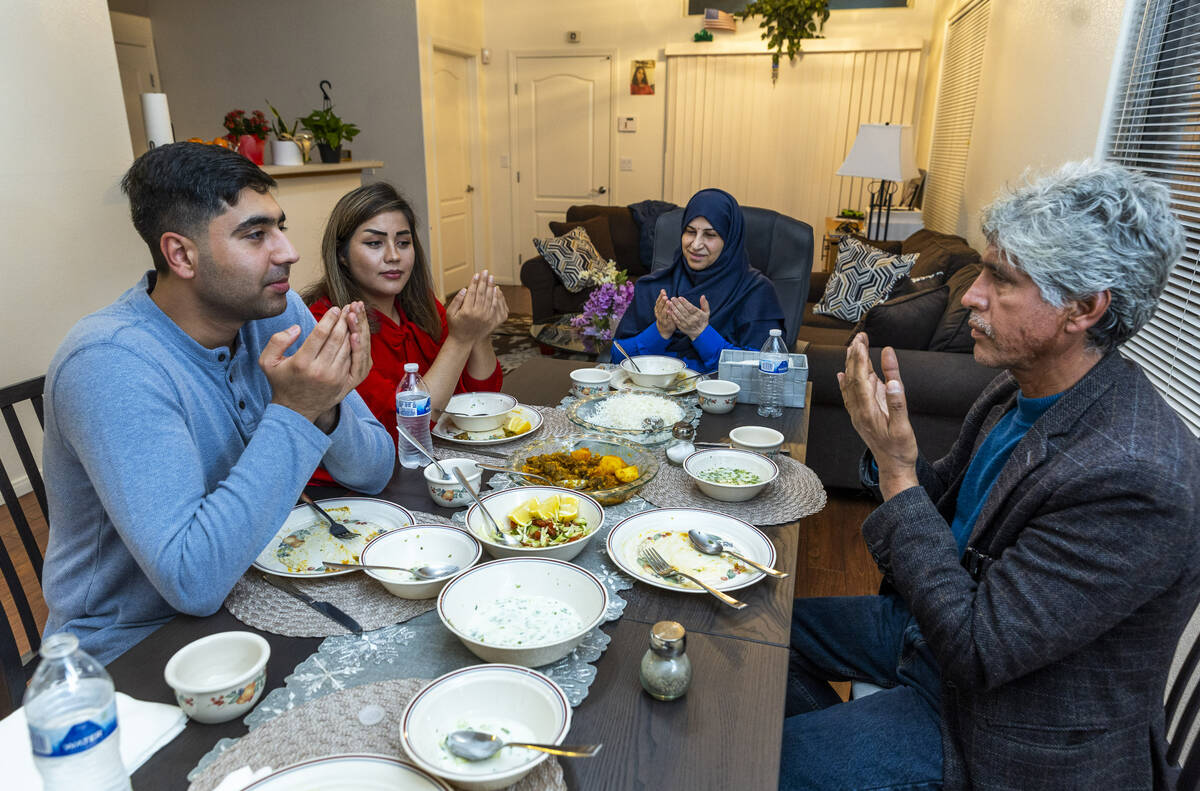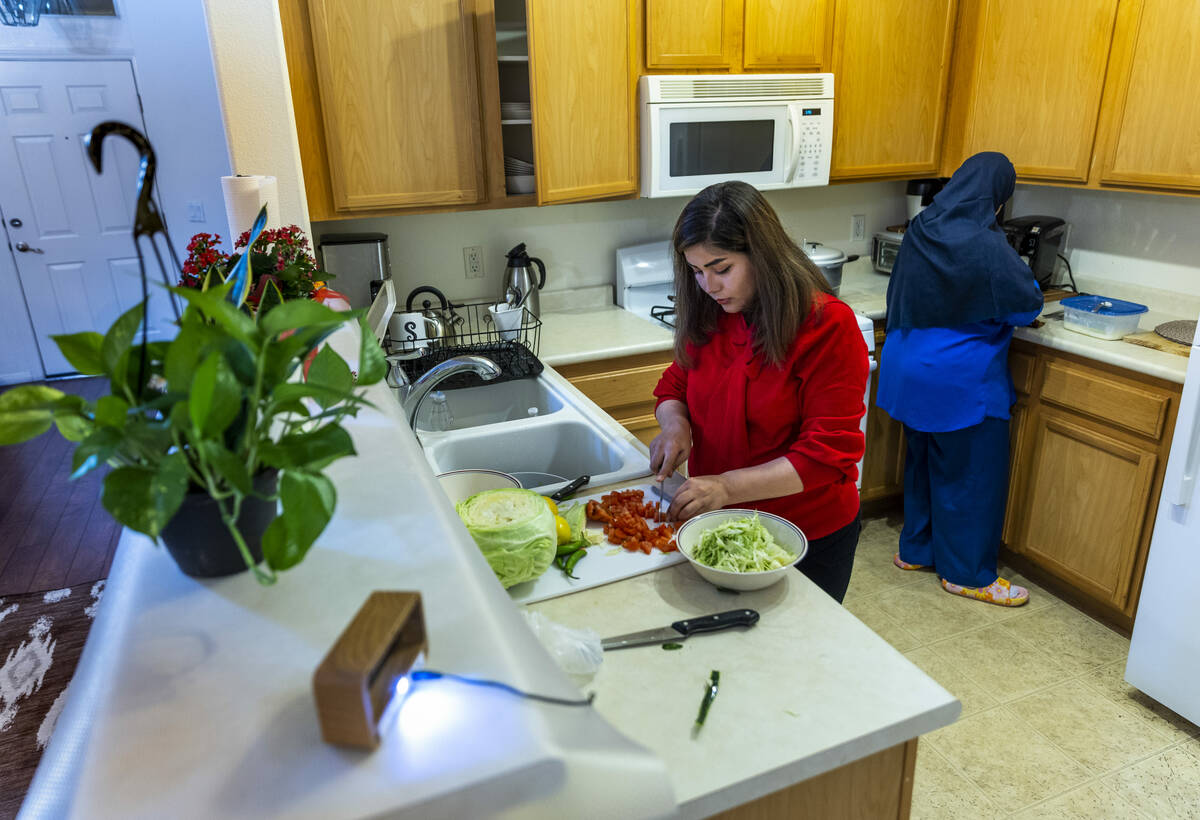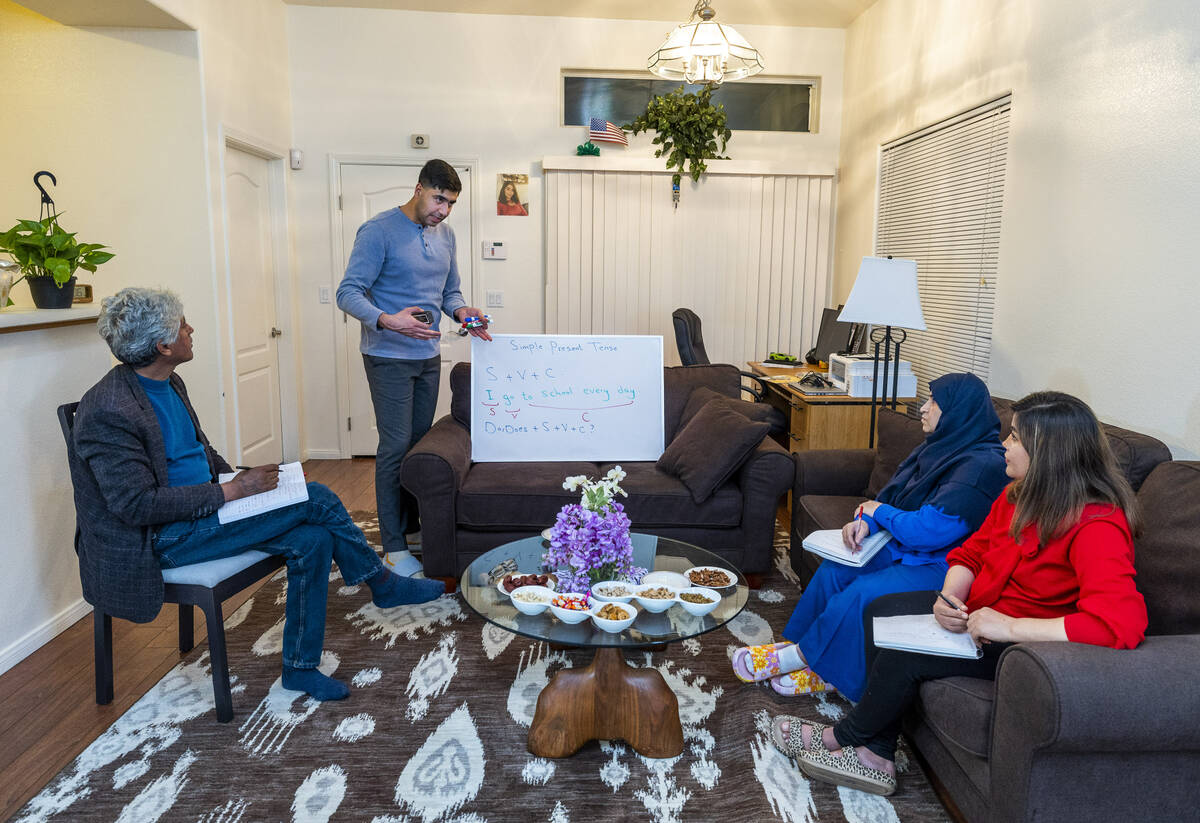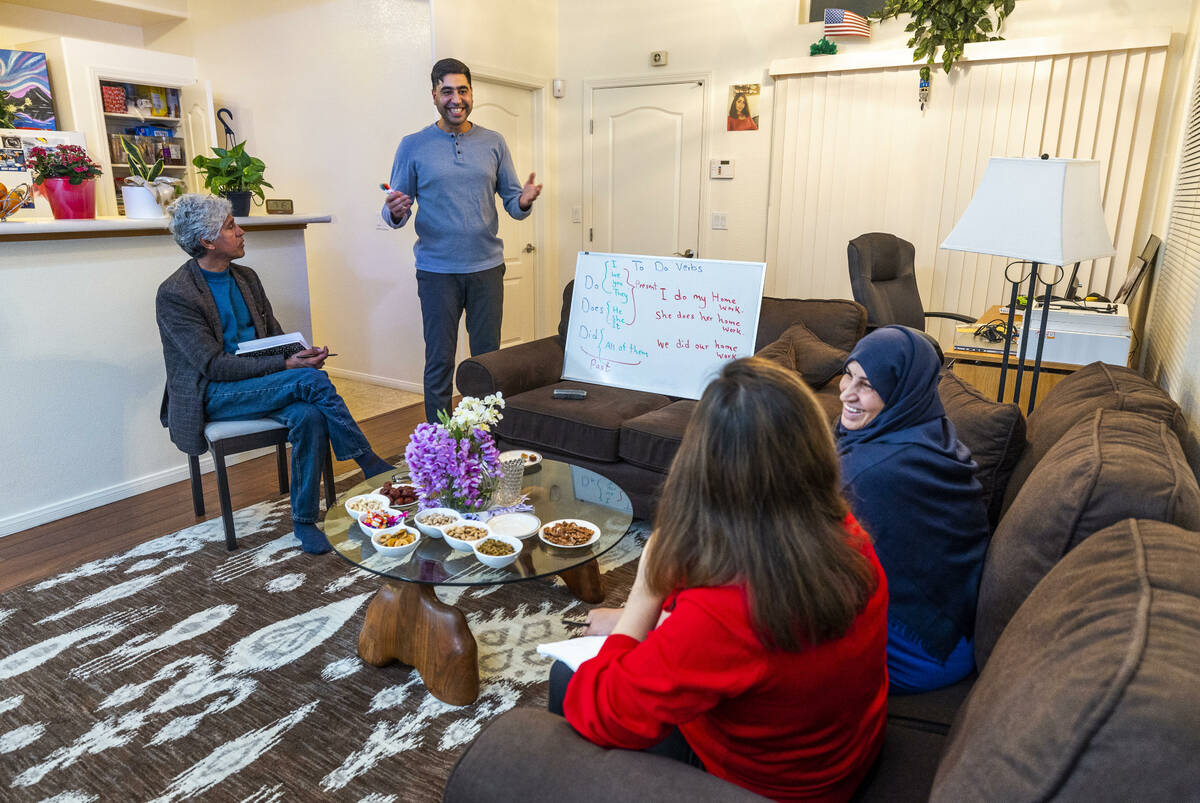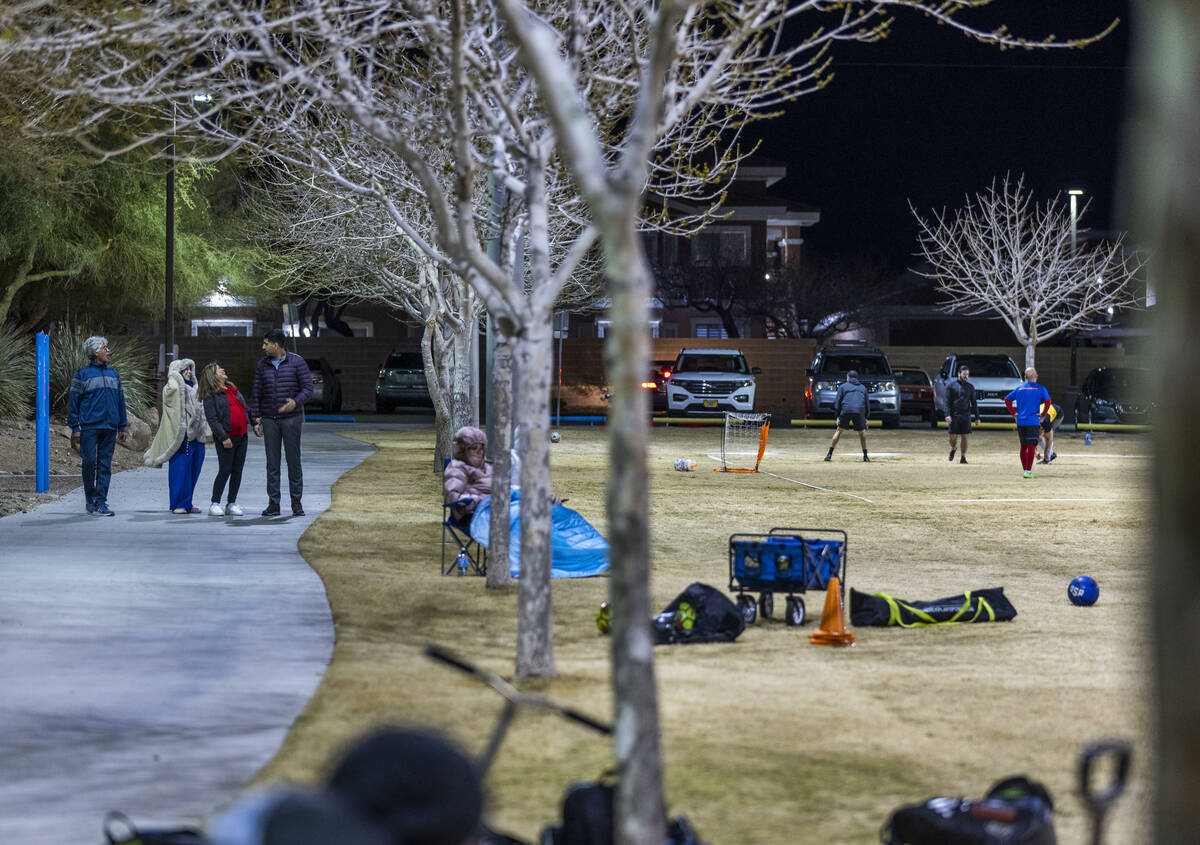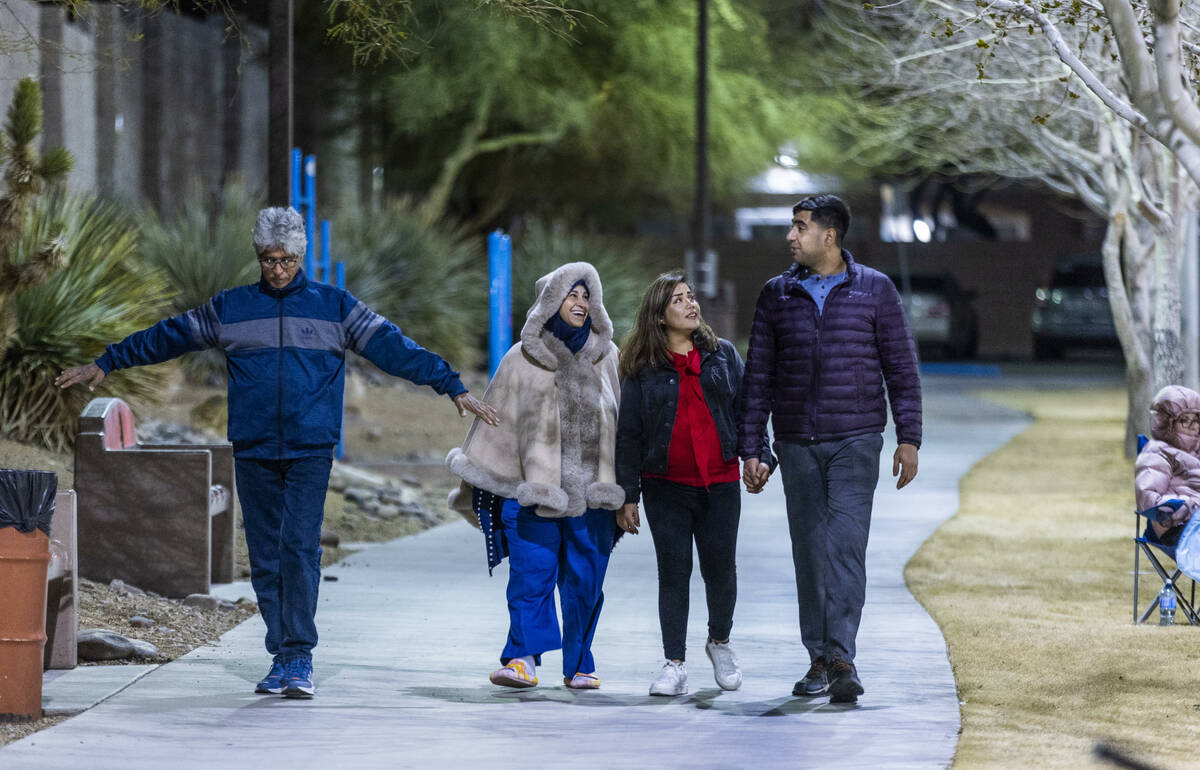Against the odds, Afghan family reunites in Las Vegas
Editor’s note: This is the fifth story in an occasional series. The Review-Journal agreed to omit some last names for the safety of family members still in Afghanistan. For previous stories, visit lvrj.com/benny.
On Presidents Day, an Afghan family separated during the fall of Kabul to the Taliban celebrated how, against all odds, they had reunited in Las Vegas.
They had much to celebrate.
Mohammad “Benny” Shirzad, then 26, had arrived alone in Las Vegas to live with the parents of the U.S. Air Force captain who, in August 2021, piloted his evacuation flight out of Kabul.
Shortly after his arrival, he would spend his first Thanksgiving at the Henderson home of retired U.S. Air Force Lt. Col. Scott Hoffman and his wife, Ellen. The Hoffmans, troubled by the plight of Afghan allies, made it their mission to help Shirzad, who had worked for a U.S. government contractor, reunite with his wife, Shabana, and parents, Abdul and Nazanin.
Mission accomplished. On the Presidents Day holiday, the family planned to celebrate their good fortune by going to dinner at a Persian restaurant. Shirzad had the day off from his new job providing internet technology services for a state government agency.
As the family talked with a reporter, they pondered the meaning of the holiday. Nazanin, who knew it was Presidents Day, thought there was a tradition of wearing green clothing.
Once Ellen Hoffman, who was visiting the family at their new apartment, explained the holiday, Nazanin said she had read about President Abraham Lincoln, “how he was killed and that he was a brave man.”
“When you are interested in a country, in a place, you will research it,” said Nazanin, who had watched documentaries and read books about the U.S. Her son, educated at an Afghan university, translated her remarks.
The family had dreamt of coming to the U.S., she said, but not like this.
During the chaotic U.S. withdrawal from Afghanistan, Shirzad worked as a flight attendant on evacuation flights by an Afghan airline. As Kabul fell, American soldiers told him and his crew they were in danger and to board a U.S. military aircraft to safety.
His wife and parents tried to join him but were turned away at the gates of the airport, which was under attack. Shirzad was flown to Fort Dix in New Jersey for processing and eventually made his way to Las Vegas.
Last September, Shabana, who with her in-laws escaped to Pakistan, secured a rare visa to the U.S. In late January, her in-laws entered the U.S. as humanitarian parolees and joined the young couple in Las Vegas.
‘Don’t grieve, and don’t forget your dreams’
Five years ago, when Shirzad was working for a U.S. government contractor in Afghanistan, his life had been threatened and his car shot at. He was told his mother would be kidnapped if he did not stop working for the Americans.
Nazanin, too, had been directly threatened as she traveled from village to village as an aid worker and human rights advocate for nongovernmental organizations, according to her application for humanitarian parole.
Ideas she shared in the villages — that women should not be beaten or forced into marriage — were often met with hostility, the application said.
One man said he would kill her with the scythe in his hand. Some threw stones at her. Others threatened to burn her, just as they had burned banners she’d hung at election sites.
She told her son that if she were killed, “Please don’t grieve, and don’t forget your dreams,” the application said.
The work she was doing then is forbidden today. The Taliban have banned women from working for nongovernment organizations, with most other forms of employment.
Women can no longer attend universities. Girls can no longer go to school once they enter their teens.
And the lives of Afghans who aided Americans are at greater risk.
After their apartment was repeatedly searched by the Taliban, Nazanin, Abdul and Shabana fled with a few belongings to Pakistan, where they hoped to live in relative freedom until they could come to the U.S. But after seeing Taliban there, they hid in their apartment, as they’d done in Kabul.
Now, Shirzad’s parents relish daily walks in their Henderson neighborhood. Abdul enjoys seeing both the young and the old, and people playing with their dogs and having fun with their families.
“People just say, ‘Hello,’ and they don’t disturb you,” Abdul said, his son translating.
He and his wife are focused on learning English. Abdul hopes to get work, and Nazanin to find a community of women. But for now, they are content.
“It’s such a pleasure for us to see that all the people from different countries, from different ethnicities, from different religions, that they are living under one flag and one rule here in the United States,” Nazanin said.
Afghans remain in limbo
To help reunite the family, the Hoffmans sought help from the Legal Aid Center of Southern Nevada and U.S. Sens. Catherine Cortez Masto and Jacky Rosen, both D-Nev.
Each step of the way, it came down to the wire, with the family’s Pakistan visas due to expire or the window about to close on Shabana obtaining an interview at the U.S. Embassy.
“I pushed the administration hard to ensure Benny could reunite with his wife, and I wasn’t going to let more government bureaucracy keep him from bringing his parents to safety,” Cortez Masto said in a statement to the Review-Journal.
Rosen said in a statement, “I’m glad to see that — after months of work to make this a reality — Benny and his family have been safely reunited. … We must do more as a country to see that individuals and their families who provided invaluable support to American troops in Afghanistan are able to find safety.”
Many Afghans remain in limbo, including some who, like Shirzad’s family, escaped to Pakistan.
Days after the family’s Presidents Day celebration, hundreds of at-risk Afghans protested in Pakistan’s capital over the delays in the approval of their U.S. visas.
The U.S. government said it would fast-track visas for those at heightened risks, including those who had worked for the U.S. government, U.S. based media organizations and nongovernmental organizations. But protesters told The Associated Press they had yet to obtain the preliminary interview necessary to begin the visa application process after waiting in Pakistan for more than a year and half.
Although Shirzad’s family made it to the U.S., Nazanin and Abdul must now navigate a path for permanent residency.
Shirzad and Shabana already have the right to permanently live and work in the U.S. through the diversity immigrant program known as the green card lottery. The couple won the lottery, placing them among the less than half of 1 percent of applications who are randomly selected.
Abdul and Nazanin, who as humanitarian parolees are permitted to remain in the country for two years, are applying for asylum to stay permanently.
The process is a long and difficult one that requires applicants to document that they would be subject to persecution if they returned to their home country, said Bonnie V. Smith, an immigration lawyer with the Legal Aid Center.
It can take six to 10 years to receive an asylum interview, she said, and the outcome is uncertain.
Shirzad said, “Our story has not ended yet.”
‘The situation is getting worse’
Since August 2021, some 80,000 Afghans have been evacuated to the U.S. without Congress enacting legislation to fast-track their permanent residency.
As things stand, Afghans must apply individually for asylum at a time when there already is a massive backlog, said Vance Serchuk, a former senior adviser on national security and foreign affairs to the Senate Committee on Homeland Security.
They may “find themselves in a kind of legal limbo or jeopardy — or even worse, in danger of actually being sent back to Afghanistan, which is stunning,” said Serchuk, who serves on the board of the Afghan Future Fund, which provides support for at-risk Afghans.
The ideal situation, he said, would be for Congress to take action to regularize the legal status of the evacuees and to honor the country’s commitment to Afghans.
“It is incompatible with our national honor to slink away from our responsibilities,” said Serchuk, who aided Shirzad’s family in extending their Pakistani visas.
Despite the many obstacles, Shirzad wants to help other family members in coming to the U.S., including Shabana’s parents.
Shabana’s mother cries whenever they have video chats, conversations that have become infrequent as internet service has become unreliable in Afghanistan.
The country’s infrastructure is collapsing. The people, Abdul said, “they don’t have electricity. They don’t have jobs. And they’re starving to death.
“And the situation is getting worse.”
As bad as conditions are, some members of Shirzad’s evacuated flight crew have returned to Afghanistan after they were unable to find steady work in the U.S. or because their families back home needed them.
Shirzad said that he is relieved his ongoing studies have led to better and better jobs in Las Vegas so that he can support his family.
That family is growing. The young couple, who were newlyweds before their separation, are now expecting their first child, a son.
Shabana’s due date is July 5. The family jokes that the baby might arrive on the Fourth of July, giving them another reason to celebrate on the holiday.
Contact Mary Hynes at mhynes@reviewjournal.com or 702-383-0336. Follow @MaryHynes1 on Twitter.




